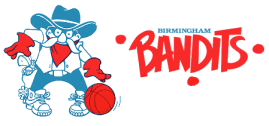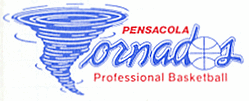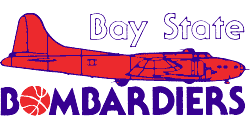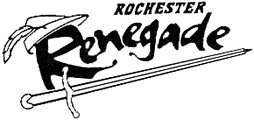|

|
Team
and League History |
| |
|
|
April
1991 |
|
| |
|
|
|
|
| |
 |
|
 Tom
McMillan, owner of the Continental Basketball Association's Pensacola
Tornados, announces that he will move his franchise before next season
due to sagging attendance. McMillan lists Birmingham, Huntsville (AL)
and Knoxville (TN) as potential sites. Tom
McMillan, owner of the Continental Basketball Association's Pensacola
Tornados, announces that he will move his franchise before next season
due to sagging attendance. McMillan lists Birmingham, Huntsville (AL)
and Knoxville (TN) as potential sites.
Jim Goodwin, the Tornados General Manager, recently visited Huntsville
and said he felt Huntsville and Knoxville "are neck-and-neck. I
couldn't list them in a one-two order, but Huntsville is an extremely
strong candidate."
The Tornados are owned by husband and wife Tom and Jane
McMillan, who purchased the the Tornados in June 1989. Tom was born in
Tuscaloosa and graduated from the University of Alabama. He also owns
SMACKCO, Ltd. a Brewton-based oil and gas exploration business.
|
|
| |
|
|
|
|
| |
 |
|
 Tornados
officials announce that they have told members
of the Alabama State Fair Authority that they
would be moving the team to Birmingham for the
1991-92 season. "We're excited about the
possibilities here. Obviously we have convinced
ourselves that we could draw and do well here."
McMillan said. The Tornados entered the league
in 1978 and the McMillans purchased the team
in 1989. Tornados
officials announce that they have told members
of the Alabama State Fair Authority that they
would be moving the team to Birmingham for the
1991-92 season. "We're excited about the
possibilities here. Obviously we have convinced
ourselves that we could draw and do well here."
McMillan said. The Tornados entered the league
in 1978 and the McMillans purchased the team
in 1989.The
Continental Basketball League was originally founded on April 23, 1946 as
the Eastern Pennsylvania Basketball League. At some point, the EPBL renamed
itself the Eastern Basketball Association. On June 1, 1978, the EBA became
the Continental Basketball Association to better reflect the geographical
expansion of the league. Since 1980, the CBA has been the
official developmental league of the National Basketball Association. In
addition to financial assistance, the CBA grooms players, coaches and
officials for work in the NBA.
CBA teams are affiliated with one or two NBA teams. Any player drafted or waived by
the
NBA club automatically becomes the property of the CBA club affiliate. The
CBA's draft takes priority over the affiliation system, and when a drafted
CBA player goes to the NBA, he would return to his original CBA team,
without regard to the affiliation. Each CBA team has one full affiliate
and one affiliate they would share with another CBA team. Club
affiliations are shuffled each season.
The CBA's season runs from November to April. Fifteen percent of the
current players in the NBA have played in the CBA. The league uses a point
system for each game; three points for a victory and a point for each
quarter won. If a team wins the game and produces more points each quarter
than the other team does, the winning team would earn seven points. The
points are used to help determine playoff seedings at the end of the
regular season.
 The McMillans will retain head coach Fred Bryan, who became a head
coach for the first time when he coached the Tornados last year. Bryan was
a graduate assistant at the University of Alabama under Wimp Sanderson
before coaching high school basketball in the state of Alabama for nine
years. The McMillans will retain head coach Fred Bryan, who became a head
coach for the first time when he coached the Tornados last year. Bryan was
a graduate assistant at the University of Alabama under Wimp Sanderson
before coaching high school basketball in the state of Alabama for nine
years.
The team will play in the Bill Harris Arena at the State Fairgrounds.
"I was really trying to get UAB Arena, but it didn't work out. We
stayed in touch (with State Fair officials). They did a good job of
keeping us interested. I was concerned about how well we would draw at
State Fair Arena. But the more I looked at the level of interest in
basketball in Birmingham and after I talked to other people, I believed we
can make it successful," McMillan said. UAB Arena didn't have enough
open dates available to work a schedule around. The lease is a one-year
agreement in which the team would pay the Authority $800 per game and
twenty percent of gross concession revenue.
 Each team's salary cap is $100,000 with the average player earning
$10,000. Players get per diem for meals on the road and the team provides
housing. "They're not in it for the money. They want the exposure. I
think it's excellent basketball, one notch below the NBA. I'm proud of the
level of competition. I think we have a great product," McMillan
said. Each team's salary cap is $100,000 with the average player earning
$10,000. Players get per diem for meals on the road and the team provides
housing. "They're not in it for the money. They want the exposure. I
think it's excellent basketball, one notch below the NBA. I'm proud of the
level of competition. I think we have a great product," McMillan
said.
The
team originally started as a CBA expansion franchise in 1978 as the Maine
Lumberjacks. After playing in Maine for a few years, the team moved to Massachusetts
and became the Bay State Bombardiers in 1983. By 1985, the team had moved
on to Pensacola to become the Tornados.
The team will be renamed in a name-the-team contest.
|
|
| |
|
|
|
|
|
|
May
1991 |
|
| |
|
|
|
|
| |
 |
|
At the official press conference, McMillan says
that Birmingham was his choice all along. "We
always wanted to be in Birmingham. We looked at
other places, but we're goad to be here,"
McMillan said.
New CBA Commissioner Terdema Ussery, II was in town for the
press conference and said that cities like Birmingham fit the
league's move toward larger markets.
Team officials hope to average 3,200 fans per game in the 5,000
seat arena. "We've got to do our job. We've got to reach the
community and win their confidence, backing and support. It's nice
to have a fresh start," McMillan said.
Corporate support is the key ingredient that was missing in
Pensacola. "Fan support is not the sole indicator of success.
We're not here to fail," McMillan said.
McMillan doesn't feel worried about prior teams that have come
and gone. "I wanted to come here from the beginning.
Birmingham has always had successful clubs in unsuccessful
leagues. We're bringing a successful league to town. I don't think
you have to worry about this league being stable. We're here for
the long run," McMillan said.
|
|
| |
|
|
|
|
| |
 |
|
Morris "Mo" McHone
is named head coach and Vice President at a news conference.
"To me, coming to a city like Birmingham with a great sports
background is great. Birmingham is a pro city. They will really
adopt pro basketball," McHone said.
After graduating
from Florida State University, McHone started his coaching career as a
graduate assistant there in 1969 after spending four years as a high school
coach. After coaching at FSU for eight years as an assistant, McHone moved to professional
basketball as an assistant coach for the National Basketball League's
Cleveland Cavaliers in 1979. The next year, he went to the NBA's San Antonio Spurs
as an assistant and in 1983 became the head coach of the Spurs. In 1985,
he was hired as an assistant coach for the Cavaliers. In 1986, he became
an assistant coach for Bradley University, where he worked until being
hired by the McMillans.
McHone believes the talent in the CBA is very good. "You
don't really know how good players in the CBA are. The difference
between the NBA and the CBA is the big men. Almost every team that
comes to Birmingham will have guards that can play in the NBA. I
think you will be shocked at the quality of play," McHone
said.
The team chose not to renew Fred Bryan's contract. No reason was given. |
|
| |
|
|
|
|
| |
 |
|
General Manager Jim Goodman announces that the
name Birmingham Bandits was chosen out of 3,000
entries in the name-the-team contest. "We were
looking for a name that was unique, energetic,
fun and could stand on its' own," Goodman said. |
|
| |
|
|
|
|
|
|
June
1991 |
|
| |
|
|
|
|
| |
 |
|
Bandits officials announce they will be
affiliated with the NBA's Atlanta Hawks and the
San Antonio Spurs. The Hawks are full affiliates
while the Spurs have rights to Bandits players
whose last name begins with the letters A
through L. |
|
| |
|
|
|
|
|
|
November
1991 |
|
| |
|
|
|
|
| |
|
|
|
|
|
|
|
|
|
|
|
| |
1991-92 Continental
Basketball Association |
| |
American
Conference |
|
National
Conference |
|
| |
Midwest
Division |
|
Eastern
Division |
|
Northern
Division |
|
Southern
Division |
|
| |
Fort
Wayne Fury |
|
Albany
Patroons |
|
Bakersfield
Jammers |
|
Omaha
Racers |
|
| |
La Crosse
Catbirds |
|
Birmingham
Bandits |
|
Oklahoma
City Cavalry |
|
Rapid
City Thrillers |
|
| |
Quad
City Thunder |
|
Columbus
Horizon |
|
Tulsa
Zone |
|
Sioux
Falls Skyforce |
|
| |
Rockford
Lightning |
|
Grand
Rapids Hoops |
|
Wichita
Falls Texans |
|
Tri-City
Chinook |
|
| |
|
|
|
|
|
|
Yakima
Sun Kings |
|
|
|
| |
|
|
|
|
|
|
December
1991 |
|
| |
|
|
|
|
| |
 |
|
General Manager Jim Goodman resigns. "I have the
chance to return home to Texas for a business
opportunity. Following Christmas, I know the
sports fans in Birmingham will discover what a
great product the CBA
is," Goodman said.
Despite playing with former University of Alabama stars Michael
Ansley and Jim Farmer, the team has not been drawing the
attendance team officials expected. Head Coach Mo McHone is named
interim General Manager.
|
|
| |
|
|
|
|
| |
 |
|
Tom Maloney is named the Bandits new General Manager. Maloney
was formerly the General Manager of the Triple-A's Denver
Zephyrs baseball club. He resigned his post with the Zephyrs in
1991 citing "philosophical differences" with the team's
ownership.
Maloney says his main goal is to increase attendance. The
Bandits are currently last in the league, drawing an average of
1,515 per game. He downplayed the Arena's location as the cause of
sagging attendance as well as dismissed the idea Birmingham would
only support football. "It doesn't seem to me this
neighborhood is that much of a problem. There are plenty of
restaurants and shopping centers in the area. I also think the
thought that Birmingham is a football city is overrated. The big
problem is the team came to the city without a lot of build-up
time. They came in unnoticed. I know the market can and will
support basketball, but it will take a little time," Maloney
said.
|
|
| |
|
|
|
|
| |
 |
|
The CBA office upheld
a protest by the La Crosse Catbirds over a disputed foul call in
Birmingham's 113-112 victory December 10 at State Fair Arena. The
ruling means the two teams will replay the final ninety-one
seconds when the two teams meet February 21 in Birmingham.
The dispute occurred with Birmingham leading 111-110 with 1:31
remaining in the game. A Catbird player, while unsuccessfully
attempting to call a timeout, lost possession of the ball. Another
Catbird player fouled the Bandits Anthony Houston while both
scrambled for the ball. The referees called a defensive foul and
awarded Houston two free throws. The Catbirds maintain that since
a change of possession had not occurred, they should have been
charged with an offensive foul and Houston would not have received
the free throws.
Catbirds Head Coach and General Manager Flip Saunders applauded
the league office for its "willingness to take steps to make
things right. They corrected the call."
|
|
| |
|
|
|
|
|
|
January
1992 |
|
| |
|
|
|
|
| |
 |
|
The Bakersfield Jammers
become the first casualty of the season when they file for Chapter
7 bankruptcy protection.
|
|
| |
|
|
|
|
| |
 |
|
Bandits Assistant General Manager Marty Owens
resigns, citing the team's poor performance at
the box office. |
|
| |
|
|
|
|
|
|
March
1992 |
|
| |
|
|
|
|
| |
 |
|
Owner Tom McMillan says the chances the Bandits
will remain in Birmingham next year are still in
doubt. The Bandits rank dead last in attendance.
Only 405 fans attended the one-game shootout,
which determined if the Bandits would advance to
the CBA playoffs. McMillan says the
turnout during the upcoming playoffs could have a bearing on
whether the team stays or goes.
McMillan has tried to negotiate a lease with the
Birmingham-Jefferson Civic Center, but to no avail. Consensus
among most fans is that the Bandits play in a bad part of town.
"I like this building and the arrangement, but I don't like
the response we've had. I can't find anyone interested in joining
me as a partner. My status is, I'm weighing my options. I didn't
get anywhere with the Civic Center. I couldn't accept their terms.
We're not anywhere near (a deal). I'm in touch with two or three
cities that want to buy my club. We've talked to Fargo (ND). I
expect to get an offer Wednesday, but not from Fargo, "
McMillan said.
A decision will be reached within three or four days. "I
would say we're one-third staying and two-thirds taking an offer
and selling the team. I believe in this league, but the CBA has
always had a hard time in the South. I don't know why,"
McMillan said.
|
|
| |
|
|
|
|
| |
 |
|
McMillan admits he is actively negotiating to sell the Bandits
to an out-of-state group that will move the franchise to another
city. "I have my first deal on the table right now. But I'm
really not happy with it and it's not local," he said. McMillan
says he has talked to a local group but they have not made an
offer. McMillan
claims he sustained substantial financial losses to move the team
to Birmingham. " I just can't continue to own and operate the
club. I'm going to have to sell it. I've done all I can do. I'm
entertaining all offers and the best one I receive will get the
team. The team did better in Pensacola than it did in Birmingham.
In Pensacola the attendance was double what it was here in
Birmingham but we were still last in the league (in attendance).
Financially, I was better off in Pensacola, but I wasn't really
doing well. I wanted to keep the team in the South and I would
like for it to stay in Birmingham, but I can't be the majority
owner and be responsible for all that takes place," McMillan
said. In a last-ditch effort to keep the team in Birmingham,
local radio personality Herb Winches hosted an all-day "Save
the Bandits" show on the radio Wednesday. Around 600 new
season tickets were pledged by callers for next season, roughly
double what had been sold this year. McMillan wasn't swayed but,
"This might offer some support to the group that is getting
together in Birmingham. But one day and one night does not make a
season. I just don't feel the encouragement or enthusiasm in this
city."
|
|
| |
|
|
|
|
|
|
May
1992 |
|
| |
|
|
|
|
| |
 |
|
 After
weeks of speculation, Bandits owner Tom McMillan
officially announces the team has been sold to a
group based in Rochester, Minnesota. The group
is headed by the Kahler Corporation, a
nationwide hotel owner and operator. After
weeks of speculation, Bandits owner Tom McMillan
officially announces the team has been sold to a
group based in Rochester, Minnesota. The group
is headed by the Kahler Corporation, a
nationwide hotel owner and operator.
The Bandits will immediately relocate and play the next season
in the CBA. Under the agreement, McMillan will retain partial
ownership.
"I believe that the club will be successful in Rochester
because of the public's awareness of the CBA in the area. It is
near other CBA clubs that will make for strong rivalries,"
McMillan said.
|
|
| |
|
|
|
|
|
|
Epilogue |
|
| |
|
|
|
|
| |
|
|
On October 1, 1999, former star of the NBA's Detroit Pistons Isiah Thomas
purchases all nine CBA teams and the league office in Phoenix, Arizona for
$10 million.
Roughly a year later, on October 2, 2000, Thomas places his CBA ownership into a formalized trust. The
NBA required this to avoid any conflict of interest before he became coach
of the NBA's Indiana Pacers.
On January 24, 2001, reports began appearing that the Continental Basketball
Association is in a grave financial state. The CBA began it's 55th season
in December of 2000.
The National Basketball Association's recent announcement that it will
start its own National Basketball Developmental League next season has put
the CBA's title of "Official Developmental League" of the NBA
into serious jeopardy. The CBA has had that position for over twenty
years. Along with the endorsement, the NBA gives the CBA an undisclosed
amount of financial support. Not only is the NBA interested in helping
develop players, it also has a stake in officials and front-office
personnel, many of whom sharpen their skills in the CBA.
The NBA hopes to create a minor league basketball farm system along the
lines of Major League Baseball, where every NBA team will have its own
minor league team or teams. "Right now, the CBA is not in the mindset of
our plans," said Michael Bass, senior director for the NBA who also
is involved with the NBDL. "And it would be premature to speak on
possible expansion in the NBDL (to include CBA teams) not having gone
through our first season," said Bass. The idea for the NBDL came
about five years ago, when the NBA launched the Women's National
Basketball Association. But because the U.S. Women's Olympic basketball
team was coming off a gold-medal triumph in the Atlanta Games and the
popularity of the women's game was at an all-time high, the NBA decided to
start the WNBA first.
Brendan Suhr, a former coach and co-owner of the CBA's Grand Rapids
Hoops who is now the director of player personnel for the NBA's Detroit
Pistons, said the NBA made an $11 million offer to then-CBA owner Isiah
Thomas to buy the league last March. "The NBA made an offer that
wasn't what Isiah expected so he decided not to sell the league at that
time," said Suhr.
Thomas still owns the league and there are a few interested buyers. Who
those buyers are only Ivan Thronton, an investment banker in New York,
knows. Thronton is in charge of the trust, making sure the league has the
day-to-day finances to operate. Thronton was appointed by the NBA to
handle the possible sale of the CBA.
 On
January 29, 2001, it was reported that the CBA was attempting to merge with
the International Basketball League. The six-team IBL would purchase and
join the ten-team CBA and the leagues would complete their respective
schedules separately this season, but meet in the postseason in a modified
playoff format. On
January 29, 2001, it was reported that the CBA was attempting to merge with
the International Basketball League. The six-team IBL would purchase and
join the ten-team CBA and the leagues would complete their respective
schedules separately this season, but meet in the postseason in a modified
playoff format.
On February 8, 2001, the Continental Basketball Association, $2 million in debt,
officially suspended play indefinitely. The trust charged with selling the
debt-ridden CBA for Isiah Thomas abandoned that effort Thursday afternoon,
announcing instead that it would return each of the league's teams to the
owners from whom Thomas bought them 15 months ago. However, not all of the
old owners want the teams. Some are allowing their franchises to fold,
some are joining the IBL and others are going to wait and see what
happens.
Most insiders believe Thomas is the sole reason the CBA has folded.
"I think he's the ultimate con man," the CBA's Yakima Sun Kings
coach Paul Woolpert said. "His legacy, as far as the CBA is
concerned, will be that he ruined an institution older than the NBA. He
single-handedly ruined a league."
"He was one of the most hated players in the history of the NBA
and now we know why," another CBA employee said. "I don't know
if he's aware that he's playing with peoples lives and livelihoods, and
that because of his ego, he dooms the league to failure."
On February 23, 2001, the Continental Basketball Association filed for
bankruptcy in Grand Rapids, Michigan. Under the laws of Chapter 7, all
league assets will be sold to help pay creditors, which include a number
of former CBA teams. |
|
| |
|
|
|
|
|
| |
|